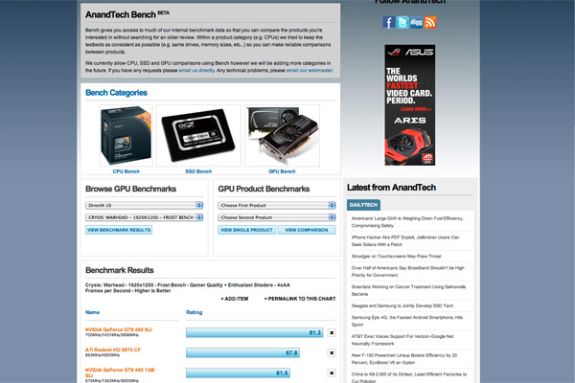Ask and You Shall Receive: GPU Bench is Live
by Anand Lal Shimpi on August 12, 2010 8:42 PM EST- Posted in
- Site Updates

One day I got the bright idea to benchmark the living crap out of everything I could find. What resulted was a huge Excel sheet of CPU performance results. Then Intel released the X25-M and I realized that I would have much more repeatable and reliable numbers if I used SSDs (don't have to worry about defragging between runs), at which point I re-ran everything in the Excel sheet.
To make a long story short, we launched a feature called Bench. It's a comparison tool that lets you pit products against one another using our own internal test results. If you want to find out whether the Core i5 750 will be a significant upgrade from your Core 2 Quad Q6600 you can head over to Bench and find out. We have over 100 CPUs in Bench today across over 20 benchmarks. CPUs are being added all the time as they come out and we're constantly evaluating new benchmarks to introduce as well.
When I'm not testing CPUs, working with Brian on smartphones or playing with Mac gear, I'm knee deep in SSDs. I've been itching to write a follow-on to the SSD Relapse, however not enough has changed just yet. Plus with all that's happening in the other segments I cover directly, it's easier for me to focus on shorter SSD articles. Adding SSD performance data to Bench was an obvious next step, which I made not too long ago.
You all have been asking for three things when it comes to Bench fairly consistently. You want the ability to have all benchmarks sorted the same way (e.g. higher is better), the ability to compare more than two products and you want a GPU version of Bench. Today I'm happy to announce that the first version of GPU Bench is live.
We've tweaked the landing page for Bench a bit to let you access CPU, SSD and GPU Bench data even easier. As is the case with CPU and SSD Bench, as new cards get released we'll be expanding the GPU Bench database to include them. At present we go back as far as the GeForce 8800 GT and Radeon HD 3870 (at 1680 x 1050).
I hope you enjoy the addition and expect more Bench features to surface as the year goes on. As always, thanks for reading :)










70 Comments
View All Comments
Brainonska511 - Thursday, August 12, 2010 - link
Thanks. It's a great feature. I used the CPU bench feature when I was trying to decide between a Phenom II X2/X3 and an Athlon II X4 (ended up with the Athlon II X4).Torgog - Thursday, August 12, 2010 - link
I was about to give up on Anandtech as I've so few reviews of mobos and graphics cards as of late. Then, WHAM!!! - you produce one of the coolest things I've seen in a long time. Way to go! I think I'll hang on for the CPU and SSD benches.Stokestack - Friday, August 13, 2010 - link
"I realized that I would have much more repeatable and reliable numbers if I used SSDs"First off, cool feature.
But... based on SSD tests on this very site, is that statement true? Given the way that SSD performance can degrade over time and require defrag-like procedures anyway, aren't hard drives potentially more reliable?
Anand Lal Shimpi - Saturday, August 14, 2010 - link
A good SSD produces *far* more repeatable numbers than a hard drive. Remember that even in its worst case, a good SSD is still significantly faster than a HDD.All of our CPU bench testbeds use Intel X25-M G1s with enough free space on the drive to negate all of these issues. When we switch over to the next generation of SSDs for our tests (SandForce or X25-M G3 based) the concern won't even remotely register :)
Take care,
Anand
anactoraaron - Thursday, August 12, 2010 - link
It's like getting a great expansion pack to a great game.I assume the next step in bench's evolution is mobile cpu's/gpu's.
Donkey2008 - Friday, August 13, 2010 - link
Unless of course that game is MW2. Then again, you did say "great" game so it wouldn't count anyway.Thanks Anand. Graphics cards have the ability to make-or-break a gaming system like no other component, so this GPU bench is right on the mark. As much as tech folk discredit Futuremark, I still think 3DMark 11 will be a valuable validation and troubleshooting tool and I hope it is included in your tests after it is released. It may not be 100% perfect in predicting absolute FPS in all games, but 3DMark has always been a great test to ensure that your new system is "in the neighborhood" of other systems with similar specs.
Anyway, thanks and keep up the great work.
KZ0 - Friday, August 13, 2010 - link
Yes, mobile CPUs and GPUs would be absolutely awesome, and being able to compare mobile products with desktop products. Especially very useful on deciding on whether to by a laptop or a desktop for a certain set of tasks.Also, wonderful expansion, keep it up.
seapeople - Friday, August 13, 2010 - link
+1 on the mobile benchmarks.The benchmarks here are great... unless you're interested in a new laptop, in which case you're out of luck.
Anand Lal Shimpi - Saturday, August 14, 2010 - link
We've been talking about ways to do mobile CPU and GPU benchmarking for a while now. We've got some things in the works :)Take care,
Anand
FunBunny2 - Thursday, August 12, 2010 - link
While admirable, you really need to test true Enterprise SSD. STEC ZeusIOPS would be a good place to start. Retail parts should never be used in any production server. Never.